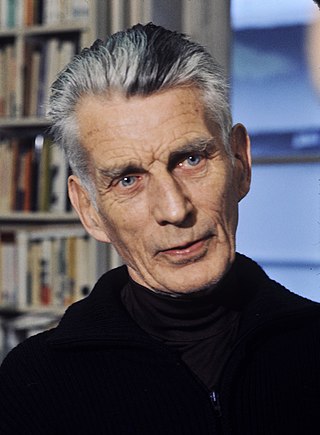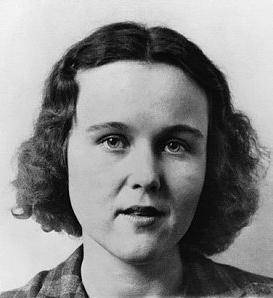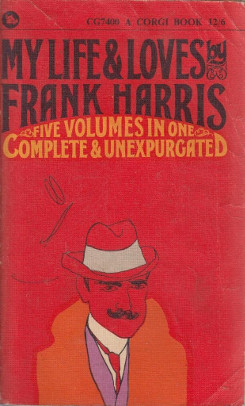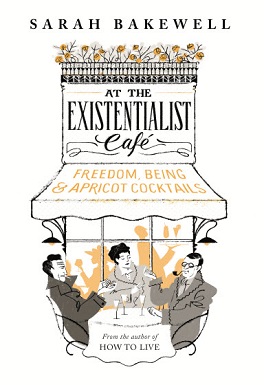
Samuel Barclay Beckett was an Irish-born writer of novels, plays, short stories and poems. His literary and theatrical work features bleak, impersonal, and tragicomic experiences of life, often coupled with black comedy and nonsense. His work became increasingly minimalist as his career progressed, involving more aesthetic and linguistic experimentation, with techniques of stream of consciousness repetition and self-reference. He is considered one of the last modernist writers, and a key figure in what Martin Esslin called the Theatre of the Absurd.

William Seward Burroughs II was an American writer and visual artist. He is widely considered a primary figure of the Beat Generation and a major postmodern author who influenced popular culture and literature. Burroughs wrote 18 novels and novellas, six collections of short stories, and four collections of essays. Five books of his interviews and correspondences have also been published. He was initially briefly known by the pen name William Lee. He also collaborated on projects and recordings with numerous performers and musicians, made many appearances in films, and created and exhibited thousands of visual artworks, including his celebrated "shotgun art".

Richard Nathaniel Wright was an American author of novels, short stories, poems, and non-fiction. Much of his literature concerns racial themes, especially related to the plight of African Americans during the late 19th to mid 20th centuries suffering discrimination and violence. His best known works include the novella collection Uncle Tom's Children (1938), the novel Native Son (1940), and the memoir Black Boy (1945). Literary critics believe his work helped change race relations in the United States in the mid-20th century.

Alexander Whitelaw Robertson Trocchi was a Scottish novelist.
Montparnasse is an area in the south of Paris, France, on the left bank of the river Seine, centred at the crossroads of the Boulevard du Montparnasse and the Rue de Rennes, between the Rue de Rennes and boulevard Raspail. It is split between the 6th, 14th, and 15th arrondissements of the city. Montparnasse has been part of Paris since 1669.

The Beat Generation was a literary subculture movement started by a group of authors whose work explored and influenced American culture and politics in the post-World War II era. The bulk of their work was published and popularized by Silent Generationers in the 1950s, better known as Beatniks. The central elements of Beat culture are the rejection of standard narrative values, making a spiritual quest, the exploration of American and Eastern religions, the rejection of economic materialism, explicit portrayals of the human condition, experimentation with psychedelic drugs, and sexual liberation and exploration.

James Arthur Baldwin was an African-American writer and civil rights activist who garnered acclaim for his essays, novels, plays, and poems. His 1953 novel Go Tell It on the Mountain has been ranked by Time magazine as one of the top 100 English-language novels. His 1955 essay collection Notes of a Native Son helped establish his reputation as a voice for human equality. Baldwin was an influential public figure and orator, especially during the civil rights movement in the United States.

Joan Vollmer was an influential participant in the early Beat Generation circle. While a student at Barnard College, she became the roommate of Edie Parker. Their apartment became a gathering place for the Beats during the 1940s, where Vollmer was often at the center of marathon, all-night discussions. In 1946, she began a relationship with William S. Burroughs, later becoming his common-law wife. In 1951, Burroughs killed Vollmer. He claimed, and shortly thereafter denied, the killing was a drunken attempt at playing William Tell.
Olympia Press was a Paris-based publisher, launched in 1953 by Maurice Girodias as a rebranded version of the Obelisk Press he inherited from his father Jack Kahane. It published a mix of erotic fiction and avant-garde literary fiction, and is best known for issuing the first printed edition of Vladimir Nabokov's Lolita.
20th-century French literature is literature written in French from 1900 to 1999. For literature made after 1999, see the article Contemporary French literature. Many of the developments in French literature in this period parallel changes in the visual arts. For more on this, see French art of the 20th century.
Merlin was an avant-garde English-language literary magazine published in Paris. Seven issues were released between 1952 and 1954. It published the work of Samuel Beckett, Henry Miller, Christopher Logue, Pablo Neruda, and Jean-Paul Sartre, among others. Merlin's politically loaded literature and discomforting stories contributed to the publication's reputation as one of the most serious and experimental post-war English-language magazines.

Shakespeare and Company is an English-language bookstore opened in 1951 by George Whitman, located on Paris's Left Bank.

Café de Flore is one of the oldest coffeehouses in Paris, known for its emblematic shopfront and celebrated for its famous clientele, which in the past included influential writers, philosophers, and members of Parisian high society (tout-Paris). The café is located in Saint-Germain-des-Prés, a historic quarter on the left bank of the Seine. It sits the corner of Boulevard Saint-Germain and Rue Saint-Benoît, in the 6th arrondissement.

The Adding Machine: Collected Essays is a collection of essays written by Beat Generation writer William S. Burroughs. This collection was first published in the United Kingdom in 1985, followed by an American edition in 1986. The subtitle for this book differs between editions: the first edition was published in the UK with the subtitle Collected Essays while the American version is subtitled Selected Essays.
Literature of the 20th century refers to world literature produced during the 20th century.
Richard Woodward Seaver was an American translator, editor and publisher. Seaver was instrumental in defying censorship, to bring to light works by authors such as Samuel Beckett, Jean Genet, Henry Miller, William S. Burroughs, Hubert Selby, Eugène Ionesco, E. M. Cioran, D. H. Lawrence, Jack Kerouac, Robert Coover, Harold Pinter and the Marquis de Sade.
James Campbell is a Scottish writer.

My Life and Loves is the autobiography of the Ireland-born, naturalized-American writer and editor Frank Harris (1856–1931). As published privately by Harris between 1922 and 1927, and by Jack Kahane's Obelisk Press in 1931, the work consisted of four volumes, illustrated with many drawings and photographs of nude women. The book gives a graphic account of Harris's sexual adventures and relates gossip about the sexual activities of celebrities of his day.
For centuries Paris has been the home and frequently the subject matter of the most important novelists, poets, and playwrights in French literature, including Moliere, Voltaire, Balzac, Victor Hugo and Zola and Proust. Paris also was home to major expatriate writers from around the world, including Henry James, Ivan Turgenev, Oscar Wilde, Ernest Hemingway, James Joyce, Leopold Senghor, James Baldwin, Richard Wright, E. du Perron, Milan Kundera and Henry Miller. Few of the writers of Paris were actually born in Paris; they were attracted to the city first because of its university, then because it was the center of the French publishing industry, home of the major French newspapers and journals, of its important literary salons, and the company of the other writers, poets, and artists.

At the Existentialist Café: Freedom, Being, and Apricot Cocktails is a 2016 book written by Sarah Bakewell that covers the philosophy and history of the 20th century movement existentialism. The book provides an account of the modern day existentialists who came into their own before and during the Second World War. The book discusses the ideas of the phenomenologist Edmund Husserl, and how his teaching influenced the rise of existentialism through the likes of Martin Heidegger, Jean Paul Sartre, Simone De Beauvoir, who are the main protagonists of the book. Bakewell takes readers on an intellectual journey, intertwining biographical narratives with philosophical discussions. The work serves as both an introduction to existentialist philosophy and a historical account of a movement that left a profound mark on 20th-century thought. The title refers to an incident in which Sartre's close friend and fellow philosopher Raymond Aron startled him when they were in a cafe, by pointing to the glass in front of him and stating, "You can make a philosophy out of this cocktail."










